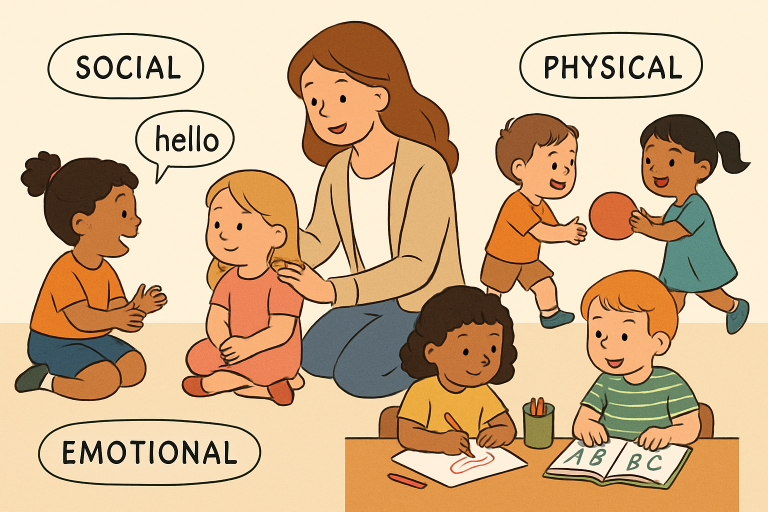Early childhood education is foundational for shaping a child’s lifelong trajectory. By embracing holistic approaches, educators ensure that development in early years extends beyond academics to nurture social, emotional, and physical well-being. For families seeking well-rounded beginnings, a Christian preschool integrates these diverse needs within a supportive community rooted in values.
Holistic education recognizes children as multifaceted learners, encouraging curiosity, social connection, and emotional security. This balanced method fosters resilience and creative problem-solving, preparing children to adapt to the complexities of modern life.
Facilitating holistic education also builds strong partnerships among families, educators, and communities. These connections reinforce positive learning habits and promote lifelong engagement. As children transition through educational stages, continued holistic support ensures ongoing personal and academic growth within a framework of ethics and compassion.
Table of Contents
Understanding Holistic Education
Holistic education is centered around the idea that children thrive when their intellectual, emotional, social, physical, and spiritual aspects of development are acknowledged and integrated into their learning journey. In a Christian middle school setting, this approach emphasizes the importance of nurturing these facets within a faith-based framework. By honoring the whole child, educators foster an environment where creativity, empathy, and critical thinking flourish together. This approach highlights the interconnection of cognitive abilities with emotional resilience and social competence, a perspective supported by emerging educational research and advocacy from organizations such as Edutopia.

Key Components of Holistic Approaches
- Play-Based Learning: Play is essential to early brain development, offering natural opportunities for creativity, exploration, and socialization. Through playful activities, children naturally develop and strengthen their cognitive and language skills.
- Emotional Well-being: Supporting children’s emotional health—by teaching self-regulation, mindfulness, and expression—lays the groundwork for self-esteem and empathy.
- Physical Development: Movement and exercise fuel healthy physical growth. Active play builds coordination and encourages lifelong healthy habits.
- Social Skills: Structured group activities and interactive tasks foster teamwork, communication, conflict resolution, and a sense of belonging.
- Cultural Awareness: Introducing children to diverse cultures and traditions opens their minds, cultivates global awareness, and nurtures respect for differences.
Benefits of Holistic Early Childhood Education
Research consistently demonstrates the advantages of holistic education, especially in the early years. By prioritizing comprehensive development, holistic programs offer the following benefits:
- Enhanced Cognitive Development: Multi-sensory learning and exposure to varied experiences boost understanding and memory retention.
- Improved Emotional Intelligence: Mindful interactions and emotional literacy lay the foundation for resilience and healthy relationships.
- Stronger Social Connections: Activities that require cooperation and communication build interpersonal skills and foster deep peer bonds.
- Physical Health: Regular movement transforms physical activity into a natural part of children’s daily routines, helping to combat sedentary habits early on.
According to Verywell Family, programs that address all facets of childhood development lead to more confident, adaptable, and socially capable individuals.
Implementing Holistic Approaches in Educational Settings
- Create a Stimulating Environment: Classrooms should include sensory-rich activities, open-ended materials, and flexible spaces that inspire exploration.
- Integrate Play-Based Learning: Learning through play can be embedded across subjects, blending structured and unstructured activities.
- Support Emotional Well-being: Introducing emotional check-ins, story time focused on feelings, and quiet reflection spaces helps children process and express emotions constructively.
- Encourage Physical Activity: Incorporating outdoor play, dance, yoga, and movement breaks can boost both physical and mental energy.
- Foster Social Interaction: Group projects, peer mentoring, and team games nurture collaboration and respect for others’ perspectives.
Challenges and Solutions
Holistic education necessitates substantial investment in time, resources, and a shift in mindset among educators, parents, and policymakers. Some main challenges include:
- Professional Development: Continuous teacher training in holistic and play-based methodologies remains essential.
- Community Engagement: Building relationships with families and the broader community helps create a network of holistic support.
- Policy Support: Advocating for funding and policies that prioritize whole-child education ensures sustainability and access for all.
Overcoming these obstacles requires open communication, shared vision, and strong leadership to ensure all stakeholders are committed to children’s holistic growth.
Future Trends in Holistic Early Childhood Education
- Integration of Technology: Thoughtfully using digital tools enhances learning through interactive content and individualized pacing, while maintaining a balance in screen time.
- Focus on Sustainability: Teaching children about nature and environmental stewardship instills in them the values of responsibility and care for the planet from an early age.
- Emphasis on Mental Health: Growing awareness of mental health’s importance promises more trauma-informed practices, emotional toolkits, and dedicated mental health resources in preschools and beyond.
Conclusion
Holistic approaches to early childhood education are instrumental in raising resilient, curious, and compassionate individuals. By focusing on the whole child, educators prepare young learners for lifelong success, equipping them to thrive academically, emotionally, socially, and physically. As communities, schools, and families work together, children are empowered to reach their greatest potential.


